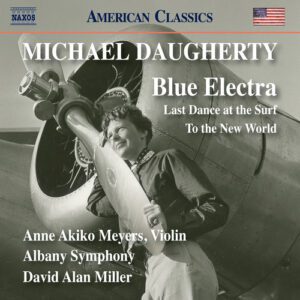You have to wonder when Michael Daugherty is going to run out of iconic bits of Americana on which to base his ever-growing catalog of works. Well, it’s a big country, and he certainly hasn’t lost his touch here. Blue Electra is a four movement Violin Concerto designed as a tribute to legendary aviator Amelia Earhart. Two movements were inspired by Earhart’s own poetry: music of great sincerity–even nobility–while the second movement scherzo (“Paris: 1932”) offers a catchy but never cheap touch of Daugherty’s trademark pop-inspired style. It all culminates in a substantial finale (“Last Flight”) that manages to be emotionally affecting without sounding overly maudlin or, thank God, programmatic. Written for soloist Anne Akiko Meyers, it would be difficult to imagine a finer performance: soulful and virtuosic by turns. The closing bars, in which Meyers ascends to her instrument’s highest register only to be brought down to earth by what sounds like a whirling aircraft propeller, make their point with sensitivity and imagination. Daugherty (and the engineers) skillfully balance Meyers against a highly colorful orchestral background, superbly furnished by the Albany Symphony under David Alan Miller.
Daugherty describes Last Dance at the Surf as a “dance symphony” inspired by the 1959 gig at the Surf Ballroom in Clear Lake, Iowa, where Buddy Holly, Ritchie Valens and The Big Bopper gave their final performance before dying in a plane crash only moments after their departure. Daugherty is a master at this kind of thing. The music consistently engages the ear, sounding much shorter than its 16-minute actual length. The tunes are terrific (as they are in Blue Electra for that matter), and again, Daugherty manages to incorporate more serious and meditative elements without letting the biographical details overwhelm the natural musical impulse. This piece would make a terrific concert opener instead of the usual warhorse overture we’re more likely to encounter, and like all the music here it’s marvelously played and recorded.
The last work on the disc, To the New World, commemorates the 50th anniversary of Niel Armstrong’s moon walk. It’s the weakest of the three pieces, which doesn’t mean that it’s bad–but it is kind of annoying. Daugherty references Armstrong’s band days playing the euphonium, his interest in the theremin (here a wordless soprano vocalise), and his fondness for Dvořák’s “New World” Symphony. Actually, it seems the affection for the latter extends to Daugherty as well. Although he quotes bits of the symphony’s second movement “Largo” in the opening section (“Moonrise”), the start of Blue Electra comes even closer to sounding inspired by the Dvořák. No matter. The somewhat Star Trekky music of the first movement is prefaced by JFK’s “Let’s go to the moon” speech, while the second is based on the rhythm of Armstrong’s “One small step for a man” comment, intoned by the soprano several times in case you missed the point. Happily the concluding “Splashdown” is the longest and most enjoyable part of the work, and it concludes what is, on the whole, a pretty darn extraordinary collection of new music by one of America’s best and most imaginative living composers.
































